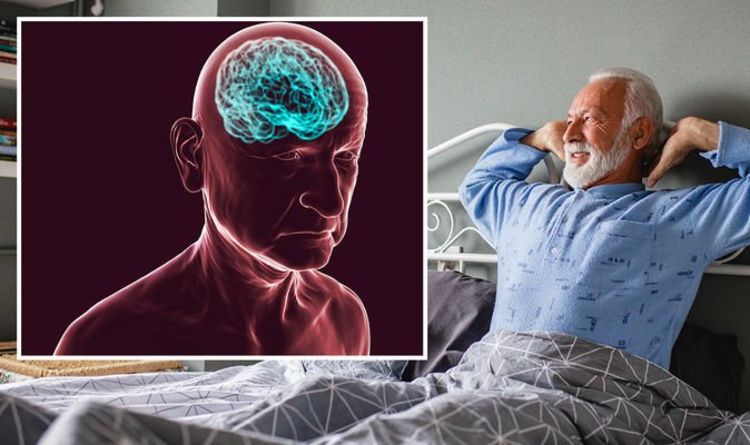Dementia: Dr Sara on benefits of being in nature
We use your sign-up to provide content in ways you’ve consented to and to improve our understanding of you. This may include adverts from us and 3rd parties based on our understanding. You can unsubscribe at any time. More info
Dementia – a general term for brain decline – produces an array of symptoms that greatly undermine quality of life. The nature of the symptoms depends on the type of dementia you have. Memory loss is a hallmark of Alzheimer’s disease – the common cause of dementia – but it is not the only warning sign.
In fact, “sleep disturbance may affect up to 25 percent of people with mild to moderate dementia and 50 percent of people with severe dementia”, warns the Mayo Clinic.
According to the health body, sleep disturbances tend to get worse as dementia progresses in severity.
What should I be looking for?
The Mayo Clinic explains: “Possible sleep problems include excessive sleepiness during the day and insomnia with difficulty falling asleep and staying asleep.”
“Frequent awakenings during the night and premature morning awakenings are also common.”

What accounts for the association?
Researchers are not yet sure which way the interaction goes – whether poor sleep causes or exacerbates dementia or if dementia leads to poor sleep.
Some researchers believe that both of these theories could be true, and the relationship could be circular.
It is thought by some researchers that the Alzheimer’s hallmark protein amyloid may be behind the link between Alzheimer’s disease and sleep-wake cycles.
The sleep-wake cycle is the 24 hour cycle that the body goes through each day, normally ensuring that we are active during the day and sleepy at night.
DON’T MISS
Statins: The ‘severe’ side effect that could result in ‘death’ [INSIGHT]
Diabetes: The drink that ‘significantly’ lowers blood sugar [ADVICE]
Cancer: The ‘early’ sign on the tips of fingernails [TIPS]
Increased amyloid in the brain is commonly seen in people with Alzheimer’s and studies have shown that raised amyloid levels may be associated with poor sleep quality.
The amyloid protein has also been linked to problems with storing memories whilst we sleep and other research indicates that poor sleep may affect the body’s ability to clear the toxic amyloid protein from the brain.
“This has led to the suggestion that improving sleep quality may have the potential to delay progression of Alzheimer’s,” reports the Alzheimer’s Society (AS).
“However, it is also possible that the changes to the sleep-wake cycle are caused by other changes in the brain, and do not have an impact on risk of Alzheimer’s.”

More research is needed to understand what the mechanisms linking sleep-wake cycles and Alzheimer’s are.
General symptoms of Alzheimer’s
The symptoms of Alzheimer’s disease progress slowly over several years. Sometimes these symptoms are confused with other conditions and may initially be put down to old age.
“In the early stages, the main symptom of Alzheimer’s disease is memory lapses,” explains the NHS.
For example, someone with early Alzheimer’s disease may:
- Forget about recent conversations or events
- Misplace items
- Forget the names of places and objects
- Have trouble thinking of the right word
- Ask questions repetitively
- Show poor judgement or find it harder to make decisions
- Become less flexible and more hesitant to try new things.

How to respond
The NHS explains: “If you’re worried about your memory or think you may have dementia, it’s a good idea to see a GP.
“If you’re worried about someone else’s memory problems, encourage them to make an appointment and perhaps suggest that you go along with them.”
As the health body points out, memory problems are not just caused by dementia – they can also be caused by depression, stress, medicines or other health problems.
“A GP can carry out some simple checks to try to find out what the cause may be, and they can refer you to a specialist for more tests if necessary.”
Source: Read Full Article



